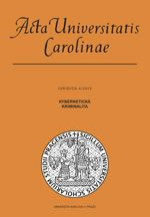Unijní občanství a evropská identita
Union Citizenship And European Identity
Author(s): Jiři ZemánekSubject(s): Law, Constitution, Jurisprudence
Published by: Univerzita Karlova v Praze, Nakladatelství Karolinum
Keywords: EU citizenship, nationality; scope of rights; case law of the Court of Justice EU; contextual individualism; shared values; postdemocratic expertocracy; transnational democracy; multilevel dimension of European identity
Summary/Abstract: Union citizenship had to be designed (Maastricht, 1992) as “a chance to reflect political imagination” bridging the community of economic liberalisation with a due political union to come. Instead, it is the national, not supranational law which guarantees largely the legal value of Union citizens’ rights (to vote at elections to EP, of diplomatic protection etc.). No reinforcement of the Union citizens’ status has been seriously attempted by the European law-maker yet. However, the ECJ case law extended the scope of the Member States’ responsibility for social rights of migrating persons. Is the anthropocentric drive of the European integration over? Or has the capacity of the Member States to achieve a political compromise been already exhausted? The way of coping with the financial crisis (“post-democratic executive federalism”) shows a lack of idea (finality) about the role of Union citizens in the constitutional system of the EU. The EU as an entity exercising (performing) pooled sovereignty of the Member States through the multilevel system of governance is missing a consistent identity-promoting policy for its citizens. Since the EU – unlike states – cannot rely on its own demos originating in ethnical, historical, cultural, emotional etc. facts, the only basis of its citizen’ identity maybe “intangible” goods like fundamental principles and values, tolerance of diversity within unity or European political and legal culture. They may be shared in networks of e-communication, too, forming part of a Europe-wide public debate as the basis of a deliberative and participative transnational democracy in the European Union. The European and national identities stand not in a contradictory, but complementary relationship („win-win“ game). The role of academia must be stimulating in this respect.
Journal: Acta Universitatis Carolinae Iuridica
- Issue Year: 59/2013
- Issue No: 2
- Page Range: 79-85
- Page Count: 7
- Language: Czech

